Books of 1 and 2 Thessalonians - explained verse-by-verse
The Books of 1 & 2 Thessalonians offer Paul's letter of encouragement to a fledgling church facing intense persecution, focusing on steadfast faith, holy living, and the glorious return of Jesus Christ, with 2 Thessalonians clarifying misunderstandings about His Second Coming, correcting false teachings about the "Day of the Lord," and addressing believers who stopped working due to these errors, all while emphasizing themes of hope, love, and perseverance through suffering. Exploring themes of Christian persecution and pastoral relationships.
The apostle begins with thanksgiving to God. Being about to mention the things that gave him joy, and that were highly praiseworthy, besides conferring great benefit upon them, the apostle chooses to do so by means of thanksgiving to God, who is the author of all good that comes to us, or is done for us, at any time.
MENTIONING THEM IN OUR PRAYERS - Paul joined praise or thanksgiving to his prayer. When we in every situation, by prayer and supplication, make our requests to God, we should add thanksgiving to them (Phil. 4:6).
So when we give thanks for any benefit we receive, we should join prayer. We should pray always and without ceasing, and we should not only pray for ourselves, but also for others, such as our friends, mentioning them in our prayers. We mention them by names, and we should mention their needs and conditions; at least we should have their faces and circumstances in our mind, remembering them without ceasing.
Note: As there are many things for which we should be thankful in our lives and in the lives of our friends, so there are many opportunities for constant prayer in regard to innumerable needs. So let us not cease to pray.
1 Thessalonians 1:2-3

How about being included in that apostle Paul's prayer? How about being remembered as a person who has exciting faith, a love that is not just words, or as someone who, despite the circumstances, maintains a firm hope in Christ Jesus?
Paul makes this highlight in this text remembering the Thessalonians, of the joy and pride he felt when he saw his spiritual children revealing his teachings, revealing Christ in the way of living and speaking.
How are we being remembered by others? Do people remember us with joy ?, as someone who has a sensitive and fervent heart, as someone who serves others without measuring efforts, or are we remembered for being fickle in faith and spiritually indifferent?
Think about it!
1 Thessalonians 1:5
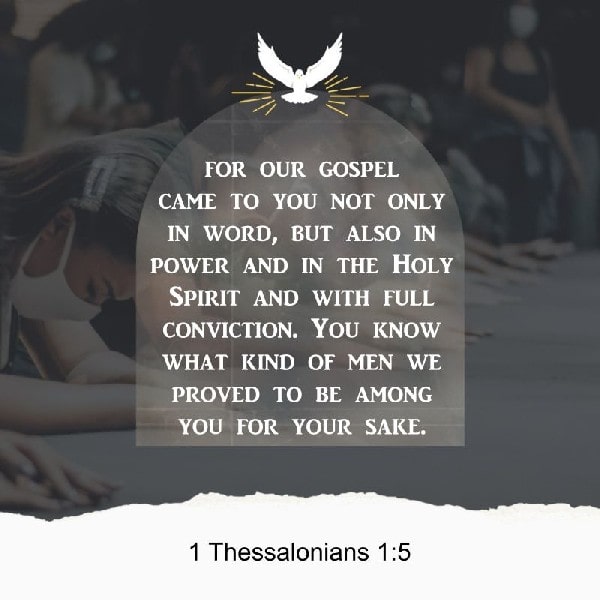
The word came in the Holy Ghost, that is, with the mighty energy of the divine Spirit.
Note, WHENEVER THE GOSPEL COMES IN POWER, IT MUST BE ATTRIBUTED TO THE OPERATION OF THE HOLY GHOST; and unless the Spirit of God accompanies the word of God, it effect by his power. Otherwise, it is but a dead letter; and the letter kills. It is the Spirit that gives life.
The gospel came to them in great assurance. Thus they received it by the power of the Holy Ghost. They were fully convinced of the truth of it, so that they would not be easily shaken in mind by objections and doubts; they were willing to leave all for Christ, and hazard their souls and their perpetual estate for the truth of the gospel revelation.
Their faith was the evidence of things not seen; and the Thessalonians knew what manner of men the apostles and their fellow-workers were among them, and what they did for them, and what success they had had.
1 Thessalonians 1:6

The apostle sought to humble himself, not only for his own sake, but for the benefit of others, by a conduct worthy of his doctrine, so that he might not with one hand destroy what he had built up with the other.
The Thessalonians, observing the kind of men who were among them, and how their preaching and living conformed to them, showed a conscious care to be followers or to imitate a good example of them.
By this they also became followers of the Lord, who is the perfect example we should imitate; and we should be followers of those who are followers of Christ (1 Cor. 11:1).
1 Thessalonians 1:10

They (the Thessalonians) decided to wait for the Son of God from Heaven (v. 10).
One of the peculiarities of our religion is to wait for the second coming of Christ. Those who believe that He will come expect that He will come to our joy.
The Old Testament believers waited for the coming of the Messiah, and believers now wait for His Second Coming. HE IS COMING! Oh, the glory!!
And there is good reason to believe that He will come, because God raised Him from the dead. This is a guarantee to all people that He will come for judgment (Acts 17:31). And there is good reason to wait for that coming, because He has delivered us from the wrath to come.
He came to obtain salvation, and He will bring it with Him when He returns, a full and final deliverance from sin, and death, and hell, from this coming wrath that will come upon unbelievers. When this wrath comes, it will continue, because it is an ETERNAL FIRE, prepared for the devil and his angels (Mt 25:41).
God examines the intentions of the heart. This examination of the heart (the total inner life, including motives), this constant scrutiny by Omniscience, is a great comfort to those whose aim is to please God and not men. Even at the best of times, "man looks at the outward appearance"; but God, from whom nothing is hidden, "looks at the heart" (1 Sam. 16:7).
We must not think that PLEASING MEN AND PLEASING GOD are opposites in the sense that receiving the disapproval of men is evidence of God’s approval. In order to win people to Christ, we must be friendly in our approach. But even here there is the subtle temptation to be a people pleaser. How important it is to always be open to the One who TESTS OUR HEARTS! Paul was very concerned about maintaining a good conscience.
And do not worry if you are a Christian who has had people at work or in your family stop talking to you because of this. Seek to please God. Do not care who thinks it is bad that you are a believer in Jesus. Stay strong.
1 Thessalonians 2:11-12

With the mental image of the great apostle treating each person individually with such care, we have important insights into his ministry; he is truly an example to follow.
- Paul’s concern for the individual value of each person before God.
- His care for people as individual members of the body of Christ.
- The individual ministry of the Holy Spirit to each Christian.
The concept of the infinite value of each soul was paramount in the gospel of Jesus Christ. The idea was revolutionary to much of Paul’s world, but it was more pertinent than ours. There is no true evangelism or pastoral care in the church that does not follow this example.
1 Thessalonians 2:15

Verse 14 says: For you, brethren, became imitators of the churches of God in Christ Jesus which are in Judea; for you suffered the same things from your own countrymen as they did from the Jews.
Paul shows that this attitude has been the trend of Jewish national history. The rejection of their own prophets reached its terrible climax in the crucifixion of Jesus (Matt. 23:29-39; Mark 12:1-12).
God's plan is to save the world through Jesus Christ, his Son. The Jews displeased him and were opposed to all men, obstructing God's program for saving men at every opportunity. In their outrageous petulance, petty exclusiveness, and blatant blindness, they not only rejected Christ himself, but they tried to prevent the good news of salvation from reaching the Gentiles.
The result of all this for the Jews was THEY HAVE ALWAYS FILLED UP THE MEASURE OF THEIR SINS (v. 16). Paul is using the well-known illustration of the cup (Isaiah 51:17); here it is the cup of iniquity. They have always been filling up the measure of their sins to the brim. The consequence is inevitable and declared: THE WRATH OF GOD HAS FALLEN ON THEM UNTIL THE END, which is the prophetic fulfillment of judgment that is still future but already determined.
To better appreciate this passage, read Romans 2, Philippians 3:1-7 or Romans 9 through 11. These passages show Paul’s keen insight into the privileges and responsibilities of the Jews, and the deep love he felt for his brothers according to the flesh.
And finally: Exclusivity, narrow-mindedness, self-centeredness, fanaticism and legalism were not and are not really limited to the Jews. These verses warn of the high cost of religion without love.
1 Thessalonians 2:19-20

CROWN BEFORE THE LORD - Here, CROWN is not a translation of the Greek word diadem, a king's crown, but of stephanos, which was the crown of victory in games, of civic valor, of military merit, of nuptial joy, of festive rejoicing, not a sign of royalty.
HOPE, JOY, AND CROWN OF BOASTING - These words of Paul are charged with emotion and feeling, but they are not exaggerations. Some people place their hope in riches, or in security, or in personal ambition. Such hopes die in this world. The apostle, with the heart of a true shepherd, has a better hope, one that transforms his frequent sufferings. The objects of his hope are his beloved children in the faith, presented to Christ as a trophy of grace (2 Cor. 11:2). The growth and spiritual progress of these children are what makes the apostle's heart leap for joy. They are the "stones of his crown," the only garland of the victor he desires.
As the glory of the teacher is in producing wise men, so the glory of the Christian is in souls won (Dan. 12:3; Phil. 2:16). The truth is that for all only this investment in human hearts has ultimate meaning.ness, self-centeredness, fanaticism and legalism were not and are not really limited to the Jews. These verses warn of the high cost of religion without love.
EXHORTATION TO GROW IN HOLINESS:
1- The way in which the exhortation is given is very affectionate. The apostle treats them as brothers; he calls them that and loves them that way. Since his love for them was very great.
2- The topic of the exhortation - that they progress more and more in the holy walk. It is not enough to remain in the faith of the Gospel, but we need to grow in the work of faith. We must not only persevere to the end, but we must improve and walk more balanced and closely with God.
1 Thessalonians 4:3

KEEP AWAY FROM ALL SEXUAL SIN - God's purpose is to make you holy, and this involves a complete break with sexual immorality. Although there is no indication of this sin in the character of the Thessalonian Christians, this teaching was necessary among those who were converting from paganism.
The fact is that one of the most difficult barriers for the pagan convert to overcome was the Christian attitude toward sex. He was raised in a world where polygamy, concubinage, homosexuality, and promiscuity were commonly accepted. Many religious services were frankly sexual in character, with rites and sacramental fornication as part of the worship.
The illegitimate or immoderate gratification of sensual appetite remains an area of temptation for all healthy, normal Christians. However, the unsanctified Christian is dangerously vulnerable to such allurements.
In our day, there is a resurgent paganism with its obscene entertainment, pornographic literature, disdain for marriage vows, promiscuity, a global obsession with sex, and a general permissiveness in sexual relations.
In times like these, the New Testament teaching on sexual purity is desperately needed, and the experience of sanctification, with its total devotion to God's will, is the true answer.
The immoral code of our time is promoted and tolerated by entrenched philosophies such as naturalism and evolutionism. It takes the dynamite of the Gospel to shatter these extraordinary refuges of depravity.
1 Thessalonians 4:6

ON THIS SUBJECT: What subject? In verse 3 of the same chapter it is said: sexual sin.
The sin of impurity, especially adultery, is a great example of injustice of which God will be the avenger, so we can understand the words: IN THIS MATTER DO NOT INJURE OR DECEIVE YOUR BROTHER. This is the subject of which the apostle is speaking in the preceding and subsequent verses, namely, the sin of impurity.
Fornication and other acts of impurity are not only sins against the body of the one who commits them (1 Cor. 6:18), and therefore very injurious to the soul and body of the sinner, but sometimes they are very injurious acts of injustice against others, especially those who are united by the marriage covenant and their posterity.
And since this sin is of such an abominable nature, God will certainly be its avenger. THOSE WHO COMMIT PROSTITUTION AND ADULTERY, GOD WILL JUDGE (Heb 13:4).
The sin of impurity is contrary to the nature and design of our Christian calling.
1 Thessalonians 4:6

ON THIS SUBJECT: What subject? In verse 3 of the same chapter it is said: sexual sin.
The sin of impurity, especially adultery, is a great example of injustice of which God will be the avenger, so we can understand the words: IN THIS MATTER DO NOT INJURE OR DECEIVE YOUR BROTHER. This is the subject of which the apostle is speaking in the preceding and subsequent verses, namely, the sin of impurity.
Fornication and other acts of impurity are not only sins against the body of the one who commits them (1 Cor. 6:18), and therefore very injurious to the soul and body of the sinner, but sometimes they are very injurious acts of injustice against others, especially those who are united by the marriage covenant and their posterity.
And since this sin is of such an abominable nature, God will certainly be its avenger. THOSE WHO COMMIT PROSTITUTION AND ADULTERY, GOD WILL JUDGE (Heb 13:4).
The sin of impurity is contrary to the nature and design of our Christian calling.
1 Thessalonians 4:7

GOD CALLS MEN TO HOLINESS. Paul exposes in this short sentence the full breadth of God's sublime purpose for believers. It was nothing less than holiness, the restoration of man's moral image of God, the area that sin had destroyed. GOD CALLED US to holiness. The call was God's initiative; it was God's love in action. The call was purposeful, and the purpose was nothing less than the most complete purity: HOLINESS OF HEART AND LIFE.
Therefore, whoever refuses to live according to these rules does not disobey human teachings, but rejects God, who gives him/her His Holy Spirit (verse 8) DO NOT DISREGARD GOD - Whoever refuses or sets aside and disregards this, DOES NOT DISOBEY HUMAN TEACHINGS, BUT REJECTS GOD. Know that these are not human teachings (of the apostle), but of the nature and will of God.
WHO GIVES HIS HOLY SPIRIT - God dwells in His people in the person of the Holy Spirit. He who disobeys sins not against a distant deity, but grieves and insults the regenerating and sanctifying Spirit of God. It is no accident that the Spirit that God gives us is called the HOLY SPIRIT.
The source of the believer's new life is the Holy Spirit, and in this we see the absolute incompatibility of a life of impurity and sin with life in Christ. The peculiar work of the Holy Spirit is to sanctify. If the ministry of the Holy Spirit is not repelled, but lovingly received, it will infallibly lead to the total sanctification of the whole person.
1 Thessalonians 4:11-12

A LIFE OF WORKING - Inactivity had produced restlessness among those who had left regular employment in Thessalonians to await Jesus' return, which is best explained in 2 Thessalonians 3:6-15, but here in this verse the problem was beginning to surface. So this business situation in turn created idle and busybodies. In any case, Paul is emphasizing the truth that brotherly love and honest work go hand in hand as Christian tests. The eagerness for religious excitement that produces great sensation is characteristic of some idle busybodies in the church today. But true faith will produce tranquility of spirit.
QUIET LIFE - Aim for a quiet life, which is the opposite of aiming to be prominently seen and heard.
MINDING YOUR OWN AFFAIRS means, "Go and do your own business" and do not meddle in other people's lives. Work with your own hands, that is, be busy doing something useful.
Many people think that just being inside the church makes them holy. If you cannot be holy on the workplace, it is not worth the effort to be holy in other places. I know that many would like to have more time to go to church, or even to devote themselves spiritually, but this is doubtful. Experience shows that nothing is worse for most people than to have nothing to do. Secular work does not deprive us of the Christian life.
THUS, OUTSIDERS WILL RESPECT YOUR WAY OF LIVING. When we Christians prove that our Christianity makes us better workers, truer friends, kinder men and women, then, and only then, are we truly preaching. The important factor is not words but actions, not oratory but life. The humblest Christian has the opportunity to reflect honor on the cause of Christ by the consistent and faithful performance of his duties, and nothing can compensate for the discredit suffered by failure to do so.
1 Thessalonians 4:13-14

Of course, Paul had already preached the doctrine of the second coming of Christ to the Thessalonians (1:10, 2:19, 3:13, 5:23). Obviously, problems arose which required more detailed instruction on this subject.
The Thessalonian Christians, so recently converted from paganism, were greatly concerned. Since the Lord had not yet come and some of them had died, the logical question was: What will become of the dead Christian at the coming of the Lord? Will they lose His glory or His kingdom and reign?
It is hardly necessary to argue that these Christians that they would not die before Christ returns.
The imminence of the second coming of Christ has been characteristic of the faith of regenerate believers in every period of church history. It is the same today.
All we need to discern the broken hearts of these bereaved Christians is to imagine that they lacked understanding and therefore were uncertain about their family and friends who were already dead at the time of Christ’s return.
So Paul’s purpose is to instruct on this issue. This is not a detailed description of the second advent. However, it is the first and, in fact, the only fully explicit statement in the New Testament about the Rapture of the Church.
THOSE WHO HAVE SLEPT. Since this figurative language regarding death is common in Judaism and among pagan Greek writers who had no concept of resurrection, it is impossible to propose any doctrinal significance based on this terminology. There is no justification for the notion of "soul sleep".
1 Thessalonians 4:16-17

With the sound of the trumpet of God by the archangel, those who have died in Christ will be called from the grave (paradise) and will rise first.
THE DEAD IN CHRIST. This little phrase brilliantly and concisely presents a precious truth: they are those who during their life on earth accepted Jesus Christ as Savior and Lord.
The statement WILL RISE FIRST has a direct bearing on the subsequent act of catching up those who are alive.
While the Lord descends, the believers ascend to meet the Lord in the air. All that remains for us to understand is that in the same caught by which the dead in Christ will be raised, those of us who are alive will be caught up together with them in the clouds. Those who are alive have no advantage over those who are dead.
WE WILL BE CAUGHT is the translation of the Greek verb harpazo, which means: "to seize, to claim eagerly for oneself, to snatch, to seize, to seize and carry away at full speed, to capture, to take by surprise".
There will be a joyful reunion with loved ones who have died and risen; to accomplish this, the bodies of those who are alive will have to be transformed (Rom. 8:23; 1 Cor. 15:50-53; Phil. 3:21).
Paul’s concluding statement leads us to understand that the really important point about all this is the glorious truth that we will be with the Lord in Heaven forever. After all, this is what makes Heaven meaningful to the Christian.
This is your goal (Phil. 3:7-14).
The curtain of the future has been pulled back, which gives enough to make our hearts leap for joy.
The ultimate triumph for the Christian is certain through Christ. What a word for these dark days!
Lately our attention has been focused on the chaos in public health. Our minds are bombarded every day with information that has left us more insecure and hopeless. Add to that the already common problems involving politics, corruption, insecurity, finances, family and so many other things that only contribute to a situation of despair, discouragement, incredulity and spiritual cooling. In this text, the apostle Paul suggests that we comfort each other. And this consolation is based on an event that is approaching, the Rapture of the Church and the Great Tribulation, and that cannot be forgotten or treated with indifference by each one of us. He refers to the first Coming of the Lord. Jesus is coming at an hour you do not expect, so we must be ready for his sudden coming.
Brothers and sisters, we cannot take our eyes off from the signs and what is about to happen, this fact should make us so happy that all other things will lose their effect on our lives.
I advise that we take our eyes off the television, the internet and strengthen ourselves in the Word of God.
But, since we belong to the day, let us be sober, and put on the breastplate of faith and love, and for a helmet the hope of salvation 1 Thessalonians 5:8.
TO THE TIME. When is Jesus coming? And at what point in history will his coming occur? You HAVE NO NEED FOR ME TO WRITE TO YOU, doubtless because of previous instruction given.
THE DAY OF THE LORD. To the Jews it was a familiar expression with a fairly fixed meaning. It is a frequent theme of the Old Testament prophets, in whose writings it is a catastrophic day of judgment of God's enemies, deliverance for God's people, faithful defense of God's justice, and the beginning of a new era of just peace. It is the present time between the present evil age and the coming golden age. In the New Testament it is "the Day," the "day of Christ," or the DAY OF THE LORD. The Old Testament concept is carried over into the New and enriched. In general, it is a period of time (not a solar day) of unstated duration, beginning with the return of Christ, or the time near his coming, and ending with the final consummation of all things. It encompasses such events as the great tribulation, the resurrection, the judgment, and the reign of Christ on earth.
THE DAY … WILL COME LIKE A THIEF IN THE NIGHT (Matt. 24:36; Luke 12:39; 21:34), who never announces his intentions and snatches all their treasures from the unwary. He comes unexpectedly.
WHEN PEOPLE SAY, "ALL IS PEACE AND SECURITY." These are words that recall Jeremiah 6:14. The idea is of false security.
THE SUDDEN DESTRUCTION of unbelievers does not mean annihilation. It means final separation from God.
TRAVAIL PAINS conveys the idea of the inevitability or irrevocability of judgment.
THEY WILL BE NO ESCAPE. There is no third alternative in the matter; it is either destruction for the unbelievers or glory with Christ.
1 Thessalonians 5:4
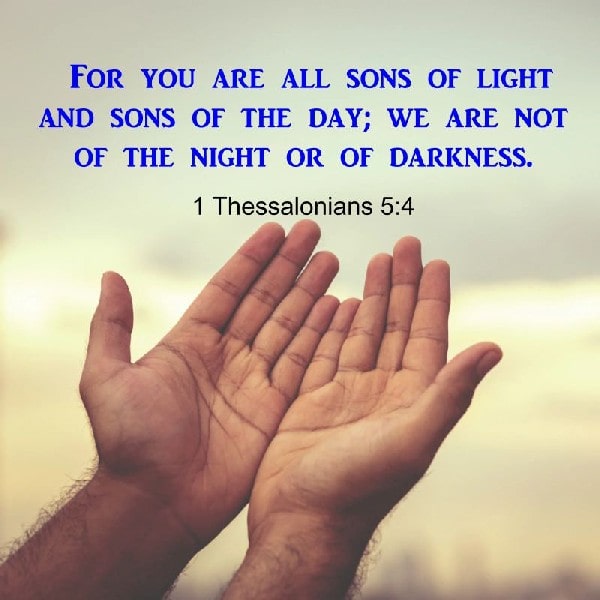
Here Paul describes how comforting that day will be to the righteous. Observe their position and privilege.
They are not in darkness; they are children of light. This was the blessed condition of the Thessalonians, as it is of every true Christian. They were not in a state of sin and ignorance like the heathen world. They were favored with divine revelation of things that are invisible and eternal, especially concerning the coming of Christ.
FOR YOU ARE ALL SONS OF LIGHT AND OF THE DAY. YOU ARE NOT IN THE DARKNESS OF THE NIGHT. The Sun of righteousness had arisen upon them with healing in his wings. They were no longer under the darkness of heathenism, nor under the shadow of the law, but under the gospel of life.
At least it would be their own fault if they were surprised by that day. They had had clear warning and sufficient help to guard against that day, and they could look forward in comfort and confidence to the Son of Man. This would be a time of refreshing by the presence of the Lord who will appear to those who wait for him for salvation, and will come to them as a friend during the day, not as a thief in the night.
1 Thessalonians 5:6

Paul continues to speak about the return of Christ and the rapture, he warns about vigilance.
LET US NOT SLEEP. It indicates being indifferent or indolent. In Ephesians 5:14, in a similar context, it connotes spiritual death.
KEEP AWAKE. To watch, to keep your eyes open, to be alert and ready.
BE SOBER. It has the meaning of calm and of a serene spirit, controlled, impartial, circumspect.
Together, these terms imply that being a child of the light is more than having a formal relationship; there must be an ethical relationship with the light. The ethical requirement of being prepared for the coming of Christ.
1 Thessalonians 5:9

FOR GOD HAS NOT DESTINED US FOR WRATH, BUT TO OBTAIN SALVATION. Those who live and die in darkness and ignorance, who sleep and are drunk as in the night, are clearly appointed to wrath; but as for those who are of the day, if they watch and remain sober, it is evident that they are appointed to acquire salvation.
OBTAIN The Greek word translated obtain conveys the idea of personal effort to earn salvation. The phrase contains an interesting idea between God's purpose and the idea of man's effort in regard to salvation. But salvation is by grace without human merit, since it is through our Lord Jesus Christ. The very effort of our choice and free cooperation with grace is made possible by the indwelling Christ (Col. 1:27). And the certainty and certainty of the divine destiny is the great support and encouragement of our hope.
If we obtained salvation by our own merit or power, we would have little or no hope of it. But when we recognize that we obtain it by virtue of God's plan, which certainly cannot be shaken, we build on this an unshakable hope..
1 Thessalonians 5:12-13

Those who labor - connotes costly effort. Their office was not merely an honorary one. These leaders directed the organization, managed the money, and gave advice on spiritual matters. Their training was probably obtained in the course of their work. The expression IN THE LORD implies the spiritual quality of their leadership and personal motivation, as well as the type and extent of the authority they exercised. From this and other passages we gain an idea of how strictly organized these Christian societies were, and we see the prominent place their congregations gave to spiritual and moral discipline.
Paul urges them to recognize their leaders in such a way as to appreciate their true worth.
HAVE GREAT RESPECT AND LOVE - Agape (love) does not depend on personal likes or dislikes. Nor should this esteem be based simply on respect for office, but on a true appreciation of the lofty task and faithful work that the leaders perform.
Church leaders are not always as qualified and diplomatic as they should be. This may have been the situation in Thessalonica. A little understanding of the obligations of leadership would solve most of the misunderstandings that have arisen.
We need wise leadership today, but we need wise followers even more. AN ARMY OF CAPTAINS AND COLONELS NEVER WON A BATTLE.
1 Thessalonians 5:14
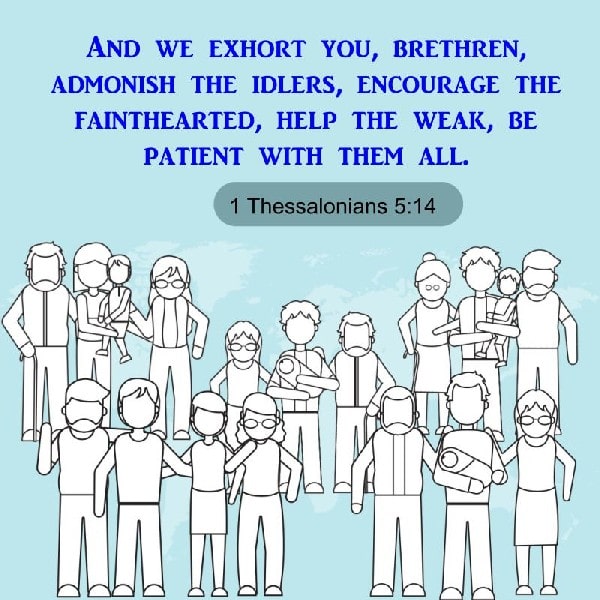
It is quite likely that the three classes called idlers, fainthearted and weak correspond to the three groups addressed in the letter. In this case, the idlers would be the meddlers full of enthusiasm. The fainthearted would be those who were concerned about those who died in Christ and about the returning of Christ. The weak would be those who were especially tempted to give themselves over to immoral practices.
The apostle Paul asks the brothers to warn others; the obligation weighs on the entire church. It is not only the leaders who must exhort, warn, encourage, support and refrain from revenge.
THE IDLERS must be rebuked. The brothers should not discuss the mistakes of others behind their backs, but speak to them in love.
THE FAINTHEARTED the Greek word literally suggests "those of mean spirit" dejected, fearful who must be comforted, encouraged, encouraged, and encouraged. These fainthearted brothers need loving treatment.
THE WEAK must be supported, helped, and kept standing. Do not let the weak brother go astray; keep him in the church in such a way that he cannot escape.
These three types of believers need three different types of treatment; for this, we need discernment.
It is important that the church understands this responsibility and does not live a selfish Christianity without caring about the good of others.
1 Thessalonians 5:15

In a pagan society under cruel persecution, it would not be surprising if some believers were tempted to repay others evil for evil.
Revenge is the most natural and instinctive of character flaws. It is a negative quality that easily passes for virtue.
Paul says that it is the duty of every believer to ensure that such a misfortune does not befall the gospel.
ALWAYS DOING GOOD undoubtedly means striving sternly to live in accordance with the moral ideal of love that seeks the best well-being and happiness of all.
This explanation applies not only to our brothers, but to all people.
Therefore, we must in every way refrain from revenge. If others insult us, this does not justify our revenge by doing the same or something similar.
We must forgive, as those who are, and who hope to be forgiven by God.
1 Thessalonians 5:16

To a persecuted Christian this exhortation sounds paradoxical. 2 Corinthians 6:10 says, "as sorrowful, yet always rejoicing". Yet this is the dominant theme of the New Testament Philippians 4:4 — Rejoice in the Lord always. I repeat: Rejoice. It is not circumstances but sin that squeezes out joy.
How could they fail to rejoice even in misfortune, when they had the forgiveness of sins, the peace of Christ, the love of God, freedom from sin and fear, and the prospect of eternal glory? To be in tune with God is to share in the harmony of eternal joy. Psalm 4:7 says, "Thou hast put more joy in my heart than they have when their grain and wine abound".
Obedience opens up the riches of the experience with Christ.
Prayer motivates and nourishes obedience, placing the heart in the appropriate mentality to desire obedience.
The Holy Spirit teaches, inspires and illuminates the word of God in us.
One can pray and not be a Christian, but one cannot be a Christian and not pray.
Romans 8:15 tells us that the spiritual adoption that makes us children of God leads us to cry out in verbal expressions: "Abba Father"
Prayer is for the Christian what breathing is for life.
Prayer is the secret of holiness - if holiness has any secrets at all.
The neglect of prayer is one of the main causes of stagnation in the Christian life.
In 1 Thessalonians 5:17 God commands us to PRAY WITHOUT CEASING.
This means that we must live in a continual state of communion with our Father.
Prayer is loyalty to God. Not praying is rejecting Christ and leaving heaven. "Prayer life is the only thing that counts for heaven" (E.M. BOUNDS)
1 Thessalonians 5:17

The idea of harmony with Heaven is related to prayer without ceasing
Pray perseveringly
Never give up prayer
Never stop praying
Praying is much more than talking to God; it is also listening to God, communing with God, consciously depending on God. It is the habit of lifting up one's heart to God. The concept here implies a deliberately chosen pattern and habit of life.
Romans 12:12 - Rejoice in your hope, be patient in tribulation, BE CONSTANT IN PRAYER.
Colossians 4:2 - CONTINUE STEADFASTLY IN PRAYER, being watchful in it with thanksgiving.
Perseverance in prayer is not automatic or easy, but the joy of the Lord is sustained only by prayer.
The way to rejoice always is to pray without ceasing. We would be more joyful if we prayed more.
The idea is not that we should do nothing but pray, but that nothing we do should hinder prayer in its proper season.
Prayer will help to foster, not hinder, lawful employment and every good work.
1 Thessalonians 5:18

It stands to reason that a joyful, prayerful heart is a thankful heart, and nothing less than a thankful heart is the key to prayer and joy.
Philippians 4:6 says, "Have no anxiety about anything, but in everything by prayer and supplication with thanksgiving let your requests be made known to God."
Gratitude is a wonderful Christian virtue, but the significant thing about this commandment is the phrase IN EVERYTHING, that is, in all circumstances.
Ephesians 5:20 says, "always and for everything giving thanks in the name of our Lord Jesus Christ to God the Father."
These circumstances include joy and sorrow, sickness and health, gain and loss. Faith in God makes the difference.
Romans 8:28 says, "We know that in everything God works for good with those who love him."
How often the most unfortunate have the most thankful hearts!
As if to obviate the objection that such a life is beyond the reach of Christians, Paul adds: FOR THIS IS THE WILL OF GOD IN CHRIST JESUS FOR YOU. Such a life of victory is the heavenly Father’s loving desire for his children; it is his purpose. But it is realized only in Jesus Christ: perfectly revealed in his person; graciously provided by his passion; personally and practically realized by his presence.
1 Thessalonians 5:19

The Holy Spirit is symbolized by fire Mt 3:11 - "… He will baptize you with the Holy Spirit and with fire."
Acts 2:3 - And there appeared to them tongues as of fire, distributed and resting on each one of them.
DO NOT QUENCH THE SPIRIT. Do not quench; do not extinguisj the FIRE of the Spirit; do not stifle the inspiration; do not stifle the vocal utterances of the Spirit.
For it is this Spirit of grace and supplication that helps us in our weaknesses, that assists us in our prayers and thanksgivings.
Christians are baptized with the Holy Spirit and with fire. He works like fire, by illuminating, enlivening, and purifying people's souls.
We must be careful not to extinguish His holy fire. Just as fire is quenched by removing the fuel, so we can quench the Spirit if we do not awaken our spirit and all that is within us, to subject ourselves to the impulse of the good Spirit; and as fire is quenched by pouring water on it, or placing a great deal of earth upon it, so we must be careful not to quench the Holy Spirit by indulging carnal desires and passions, or by busying ourselves only with earthly things.
1 Thessalonians 5:20

Do not despise prophesying.
Neither despise what is spoken in the name of the Lord.
The Greek verb used, exoutheneite (to despise), is literally TO COUNT AS NOTHING.
Prophesying is listed as one of the gifts of the Spirit, but in the New Testament the general accepted meaning is TO SAY FORTH.
But God chose to speak to men through human voices, and no matter how humble and inept one may be, the listener must seek God's message for himself.
TEST EVERYTHING - discern everything. Use common sense at all costs. Examine everything carefully. Test everything. Prove everything. Test everything.
Christian judgment, common sense, and careful examination are indispensable actions in the life of the church. This is what the Spirit gives (1 Cor. 14:29; 12:10, where "discerning" is one of the gifts).
Paul does not specify the tests to be applied. Elsewhere, he implies that all spiritual gifts are to be exercised in love, that the true purpose of the gifts is to edify others, and that those who are moved by the Spirit will recognize the Lordship of Christ and strive to promote His glory.
Hold fast what is good. When the wheat and the chaff are separated, hold fast the wheat. When you discover the counterfeit by the sound of genuine metal, hold fast what is valuable. No one ever became rich by discarding what is spurious. This is the delusion of the destructive critic. To hold fast what is good, it is necessary to prove all things.
When we are clear that something is right, true, and good, we must hold fast to it and not let it go, regardless of the opposition and persecution one may face.
NOTE: The doctrines of infallibility, implicit faith, and blind obedience are not Biblical doctrines. Every Christian has, and should have, the judgment of discretion, and use his senses and exercise to discern between good and evil, between truth and falsehood (Hebr. 5:13,14).
1 Thessalonians 5:23

The prayer at the close of Paul's letter to the Thessalonians (v. 23). He had told them in the beginning of this epistle that he always made mention of them in his prayers; and now that he is writing to them, he lifts up his heart to God in prayer for them. Observe:
- To whom the apostle prays, namely, TO THE GOD OF PEACE HIMSELF. He is the God of grace, and the God of peace and love. He is the author of peace, and the lover of harmony.
- The things for which he prays on behalf of the Thessalonians: for their sanctification, that is, that God would sanctify them in all things; and for their preservation, that is, that they might be kept blameless. He prays that they might be sanctified wholly, that man might be sanctified in all things, and then that the whole man (spirit, soul, and body) might be preserved.
Where the good work of grace has begun, it must be continued, protected, and preserved; and whosoever is sanctified in Christ Jesus shall be kept unto the coming of our Lord Jesus Christ.
Paul was comfortably assured that God would hear his prayer: HE WHO CALLS YOU IS FAITHFUL, HE WILL DO IT (v. 24). The goodness and love of God had appeared to them, calling them to the knowledge of his truth, and the faithfulness of God was their assurance that they should persevere to the end; and therefore the apostle assured them that God would do what he pleased; he would perform what he had promised; he would accomplish all the desire of his goodness toward them. Our faithfulness to God depends on his faithfulness to us.
GOD’S JUDGMENT — This subject of persecution and affliction naturally raises the question of justice and fairness. The patience and faith of the Thessalonians in the midst of persecution are clear evidence of God’s righteous judgment. Their steadfastness in spite of suffering and undeserved hatred is evidence of a divine power at work. God is with the Thessalonian believers; God has a purpose; and as a result they are worthy of the Kingdom of God.
THE MORAL BASIS OF JUDGMENT (1:5-7a). Since persecution is inevitable, the believer must keep his eye on God’s purpose. The moral argument in this passage unfolds in two directions. First, God’s righteous judgment is revealed in upholding and justifying His persecuted people today; second, God’s righteous judgment is revealed in punishing the wicked and rewarding believers in a future reckoning.
THE BASIS AND NATURE OF THE PUNISHMENT: The reward will be both negative and positive: to the persecuted Christians, God will give rest (1:7). The reference is surely to Heaven itself. To those who do not know God and do not obey the gospel (1:8) they will suffer everlasting destruction. Everlasting means (aionion in Greek) a long age. The same word is used of the perpetual or eternal life of believers. This punishment signifies being banished BEFORE THE FACE OF THE LORD (away from His presence). The punishment of the wicked is endless separation from the presence of God, and therefore from all good. It is the exact opposite of the state of the redeemed, whose eternal happiness is found in the presence of Christ. These words are full of endless sorrow, almost too terrible to look upon.
Certain problems had arisen among the Thessalonian believers that prompted Paul to take corrective action in this second epistle.
Somehow the error had spread that Paul was teaching that the Day of the Lord had already come. This situation produced a ferment of agitation and alarm, and also a movement on the part of some who left the work to wait for the return of Christ. In this passage, Paul addresses this matter in a corrective manner.
The proof that the Day of the Lord had not come is that certain necessary evidences relating to that Day had not occurred yet.
These evidences are, first, rebellion (apostasy), and second, the manifestation of the man of sin, the son of perdition.
APOSTASY - Some expositors say that it refers primarily to a revolt of all against God and His rule in the world in general; others say that it is apostasy within the church.
Apostasy is very closely related to the MAN OF SIN.
In some ancient manuscripts it has "the man of lawlessness" or the man without law, instead of the man of sin. The meaning hardly changes since sin is lawlessness. He is also called the SON OF PERDITION.
This man's trait is lawlessness and his destiny is destruction. Therefore, today we need to be attentive to what the Bible says and not despair about the Lord's return.
2 Thessalonians 2:4
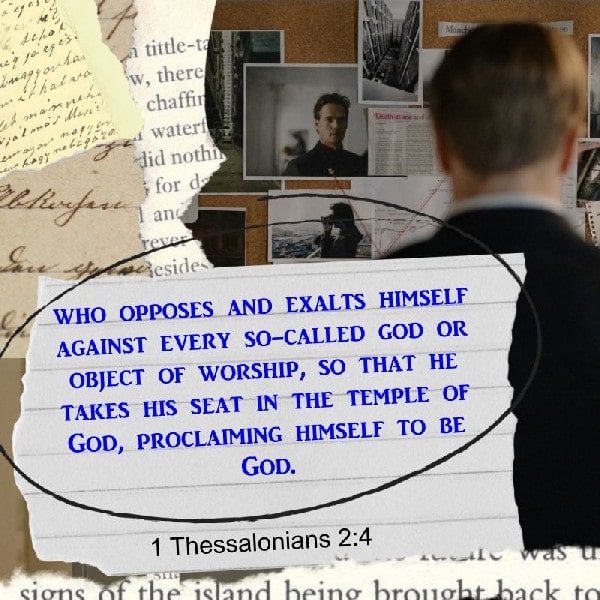
THE ANTICHRIST - This man opposes and defies God, exalting himself above all objects of worship, thus rashly and blasphemously claiming deity for himself.
The language here undoubtedly comes in part from Daniel 7 and 8. Daniel's prophecy had been partially fulfilled (perhaps initial fulfillment is a better term) in the events of Jewish history that foretold the coming of the man of sin. In about 168 B.C., Antiochus Epiphanes will set up an altar to Zeus in the Temple and sacrifice pigs in the temple area, events that will trigger the Maccabean War of Independence. In A.D. 40, Emperor Caligula will attempt to erect a statue of himself in the Temple. But Paul's description goes far beyond these faint glimpses (Mark 13:14). It is common for expositors to identify the man of sin with the antichrist mentioned in John's epistles (1 John 2:18,22, 4:3; 2 John 7) and the beast of Revelation 13:1.
Commentators consider that the temple of God is a rebuilt temple in Jerusalem. Today we know that everything is ready for the construction of the temple in Jerusalem: the priest, the red heifer and all the tools. The construction drawings are in 3D and the temple can be built within 3 months.
Verse 6 And you know what is holding him back, for he cannot be revealed until his time has come. Something or a power is holding back the man of sin until the right time for his revelation. (We will continue in the next post)
2 Thessalonians 2:7

For this wickedness is already at work, that is, the ministry of unrighteousness, or the ministry of lawlessness.
Lawlessness operates as a secret and invisible force in society and in individuals. It is satanic and powerful, but it is by the Providence God under His control. It is a mystery because its secret workings are too deep for human comprehension and also because the revelation will come in due time. This God defying force will produce the man of sin and the great rebellion.
Paul states the reason why the man of sin has not yet appeared: UNTIL THE ONE WHO HOLDS HIM HAS DEPARTED. In verse 6, the holder is in the neuter gender, and in verse 7, in the masculine. This difference may indicate something conceived as abstract from one point of view and personal from another. It may be an impersonal force that is thought to be personified. Biblical scholars have differing opinions as to the identity of the holder: it is an angel, Satan, the Jewish state, or the Holy Spirit. The idea is that the Holy Spirit indwells the church and will be taken away at the Rapture of the saints(the restraining prayerful force).
The most acceptable interpretation is that this restrainer refers to the Holy Spirit working in common grace through civil government. When civil government breaks down and restrictive law fails, lawlessness results.
But if modern readers cannot identify the restrainer, they can rejoice in the greater truth that God is in sovereign control of the world. He sets the limits of wickedness. And this man of wickedness will only be revealed in due time.
2 Thessalonians 2:9-10
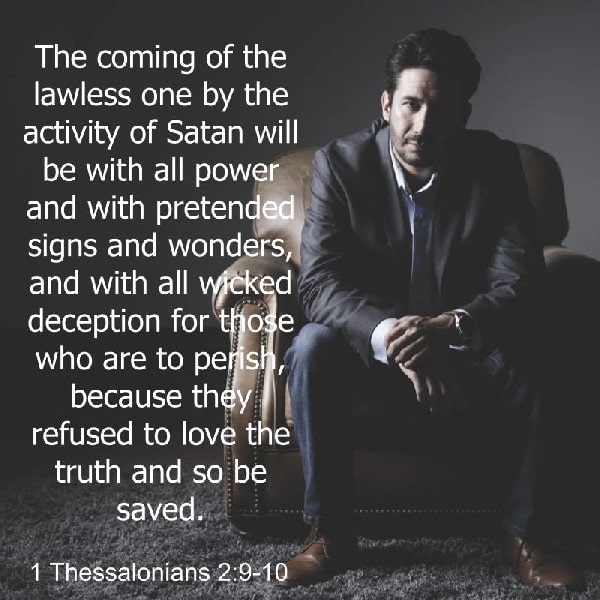
The parallels to the Antichrist and work of Christ are obvious and intentional. The man without law also has his parousia (his coming). All three nouns are used in allusion to Christ’s ministry: POWER (dunamis; the suggestion is supernatural power), SIGNS (certifying miracles that point to more than themselves), and PRODIGIES (wonders).
As to whether these three nouns are related to Christ, see Acts 2:22; Romans 15:19; 2 Corinthians 12:12; Hebrews 2:4.
Greek grammar suggests that all three words can be modified by LIE. All of them stem from falsehood and the intent to deceive, but this does not necessarily mean that these extraordinary events are mere deception.
With signs and wonders the man without law will seduce, persuade, and deceive the perishing, who are in sharp contrast to the saved. They will be deceived and are perishing BECAUSE THEY REFUSE TO LOVE THE TRUTH ANS SO BE SAVED. Their failure is not that they are ignorant of or misunderstand the truth, but that they are inhospitable to the truth, they refuse to receive it. The problem is a moral one, a matter of choice. The conclusion is that God will send them the power to create in them a love for the truth, but they have blatantly refused to receive that power or to cooperate with it. And what they reject is the only salvation for them.
May we cling to this message of salvation, for the time is coming when these events will happen.
2 Thessalonians 2:11-12

There are three phrases in the degradation of these people towards their final perdition. The first one is in verse 10 which says BECAUSE THEY REFUSED.
The second phrase is, having rejected the truth, they will believe a LIE. They have lost the ability to tell the difference between truth and error. Isaiah 5:20 describes them: Woe to those who call evil good and good evil, who put darkness for light and light for darkness, who put bitter for sweet and sweet for bitter!
The third phrase is that they suffer the inevitable judgment of God (v.12).
We see in this God working, not arbitrarily, but by the moral law, to accomplish His righteous purposes. The consequence of their blatant rejection of the light is to reach a state where darkness is no longer distinguishable from light and thus to their final ruin.
Verses 10-12 offer remarkable truths about God’s dealings with men, and about the character of sin and the unregenerate human heart.
God is not unjust. He does not force people to believe in Him. But if a person resists believing, God sometimes withdraws His grace from sinners like these in this text. He allows them to be deceived and deluded by agents of Satan; He gives them over to their own heart’s desires and leaves them to their own devices; then sin will surely have a free hand, the worst of wickedness, which will ultimately end in eternal damnation.
This letter devotes much space to dealing with the disorderly and lazy brethren in the church. This fact shows that the problem has become more serious than at the time of the writing of the first letter, in which there is relatively little space devoted to this subject (1 Thess. 4:11, 12 and 5:14). Clearly the lazy ones had not heeded the first letter. Therefore, stronger measures needed to be taken.
Perhaps because of the excitement about the Lord’s coming, the disorderly brethren were loitering, refusing to work, shirking their duties, and not taking on any responsibility. This conduct probably led them to be meddlesome and even dependent on others for food.
The church is a social community that bears responsibility for the conduct of its members. It cannot remain indifferent to these disorderly brethren. In order to maintain Christian standards, the disorderly ones must feel the pressure of Christian feeling against such irresponsible conduct. The church must avoid close association with the loiterers in order to shame them. The text does not speak of excommunication or total ostracism, but of a social indifference that indicates that a standard has been set, and that violating it provokes the rebuke of the church.
To reinforce the command, Paul first resorts to his own example and that of his companions when he was in Thessalonica, verse 3:8 says: "For you yourselves know how you ought to imitate us; we were not idle when we were with you".
IF ANY ONE WILL NOT WORK, LET HIM NOT EAT (v.10). The text makes it clear that this is a refusal to work, and that the guiding principle concerns people who fit this category: the person who does not want to work.
Now for the first time, the lazy are dealt with directly, but with evident tact.
Verse 12: WE COMMAND AND EXHORT IN THE LORD JESUS CHRIST DO THIER WORK IN QUIETNESS AND TO EARN THEIR OWN LIVING.
2 Thessalonians 3:13

NOT TO BE WEARY means "to lose courage, to weaken, to slacken, to lose heart, to faint, to waver, to be weary".
TO DO GOOD means "to do right", or "to do the just or honest thing". Perhaps Paul is saying, "Whatever people do, do the right thing; do not let those who seem spiritual but neglect their duties influence you to neglect your duties". Paul is tacitly acknowledging that dealing with this situation is a daunting and thankless task. He is encouraging the brothers not to be discouraged by the proud or disagreeable attitudes of those they are trying to help. Furthermore, they must be careful in their disciplinary action not to be harsh or unkind toward them.
Even with all of Paul’s warnings, there is the possibility that someone will refuse to obey. Considering that this is not a case of misunderstanding but of blatant arbitrariness, the apostle is ready to give his last word on the matter: If any one refuses to obey what we say in this letter, note that man, and have nothing to do with him, that he may be ashamed (vs 14). The purpose of this discipline is not mere punishment, but the correction of the offender. To shame is to "have one’s thoughts turned inward". The offender, under the conviction of the Holy Spirit, is expected to repent and be restored.
2 Thessalonians 3:16

The Lord of peace is Christ. Peace is the gift of God by grace, and the gift is given only in Jesus Christ.
PEACE (shalom) means much more than the absence of struggle. It is the spiritual prosperity enjoyed by those who receive divine favor. The greeting is more than a sincere wish. It is also the implicit promise of God’s grace, and of his peace through grace to all who believe in Jesus Christ.
Peace with God becomes the deepest peace of God communicated by the inner harmony of the whole person in all its parts and functions. Paul is praying for this.
Paul has in mind the need of his readers, and the peace of Christ is the answer. They are suffering persecution and some may be martyred; others are mourning their dead; some are worried about the Lord’s return; they are aware of the "ministry of unrighteousness"; others are afraid. Knowing these circumstances, Paul prays for the peace of Christ. He also prays for the presence and fellowship of Christ in the church: THE LORD BE WITH YOU ALL.








